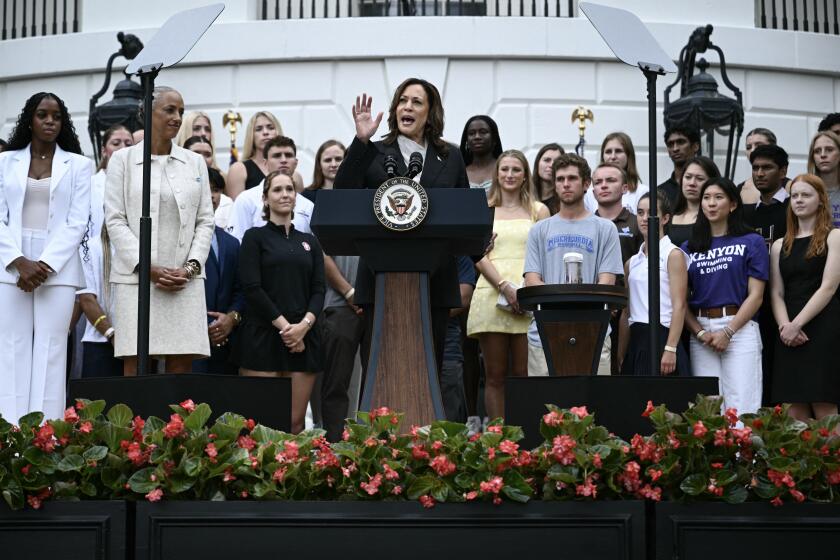Editorial: Trump just started an unwinnable trade war
President Trump wisely decided not to start a trade war this week with two of the United States’ closest commercial partners, Canada and Mexico. At least not right away, that is.
Unfortunately, he went ahead and picked an unwinnable fight with everybody else.
Trump signed orders Thursday, imposing a 25% tariff on imported steel and a 10% tariff on imported aluminum, starting March 23 — with a conditional exemption for our two neighbors. The point, according to the president, is to bring steel and aluminum jobs back to the United States by making foreign versions of the metals more expensive.
Slapping stiff, across-the-board tariffs on imported steel and aluminum only invites the vast majority of our trading partners to retaliate.
There’s no question that U.S. production of steel and aluminum has declined over the years as it has surged in Asian countries, most notably China. According to the White House, the United States imports almost four times as much steel as it exports, and 90% of the new aluminum we use comes from outside the country. The fierce foreign competition has caused the companies that produce those metals here to shut plants, lay off workers and automate more of their operations.
The issue is how to respond. And slapping stiff, across-the-board tariffs on imported steel and aluminum only invites the vast majority of our trading partners to retaliate against U.S. exports of goods and services. It also raises the price of U.S. goods made with imported aluminum or steel, as well as those that shift to (more expensive) domestic metals. Meanwhile, it does nothing to the price of foreign-made products, which won’t pay the tariffs that U.S. producers will face. With that in mind, numerous American companies and trade groups have urged Trump to abandon the tariff scheme, saying it will hurt sales and kill jobs.
That’s probably the most puzzling aspect of Trump’s move. Even without a single retaliatory action by foreign governments, the tariffs are likely to cost more U.S. jobs at the companies that use aluminum and steel than they create at the companies producing the metals.
Some administration officials have pooh-poohed this notion, arguing that these metals account for only a fraction of the cost of products like cars and beer cans. But if the cost were in fact negligible, no company using steel or aluminum would bother to switch from imported to domestic metals. The administration knows better — that’s why it’s imposing tariffs, to raise costs enough to prompt companies to switch from cheap imported to more costly domestic supplies. And inevitably, those costs will translate into lost sales and jobs.
But that’s just where the pain starts. The toll mounts as the rest of the world launches retaliatory tariffs, quotas and other trade barriers. Some potential targets have already been identified, including farm products, high-tech exports and blue jeans. Meanwhile, the chill that descends on trade with the United States will damage U.S. ports and shipping companies; according to Sen. Dianne Feinstein (D-Calif.), “Almost 25% of the steel and aluminum imported [into] the United States comes through California’s ports, generating more than $4 billion in trade activity.”
Trump has characterized the tariffs as both the culmination of a campaign promise to help U.S. industries hobbled by foreign competition and as an effort to protect national security by preserving domestic supplies of indispensable metals. The U.S. defense industry isn’t persuaded — it argues that the tariffs will do more harm that good, raising the Pentagon’s costs and hurting U.S. exports.
In truth, the Pentagon has been content for years to rely on steel and aluminum imported from allies — most of whom would be hit by the new tariffs. Trump acknowledged this problem in his proclamation on the steel tariffs Thursday, declaring he would be willing to negotiate alternatives with countries with which we have a “security relationship.”
But Trump’s preference for such transactional, country-by-country approaches is poorly suited to the challenge posed by China’s overproduction of steel and aluminum. The situation demands a coordinated regional or even global response through bodies like the World Trade Organization. Instead, by inviting other countries to impose protectionist tariffs unilaterally on national security grounds, Trump’s move threatens to make the WTO even less effective in enforcing a rules-based trading regime.
An array of business and industry groups, analysts, economists and even Republican politicians urged Trump over the last week to abandon the tariff plan, to no avail. Evidently, the president is the sort of person who won’t give up on a bad plan until he watches it fail.
Follow the Opinion section on Twitter @latimesopinionand Facebook
More to Read
A cure for the common opinion
Get thought-provoking perspectives with our weekly newsletter.
You may occasionally receive promotional content from the Los Angeles Times.





